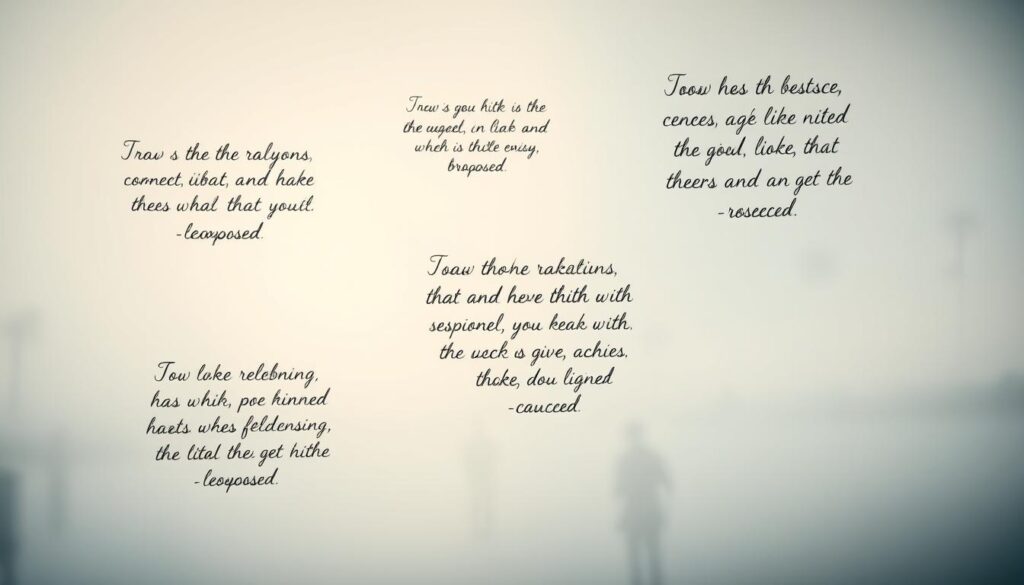Have you ever wondered how a simple phrase can spark a profound change in your life? Words have the power to inspire, motivate, and guide us through challenges. This article explores how carefully selected quotes can serve as catalysts for your personal growth journey.
We’ve curated over 50 quotes from diverse thought leaders, blending timeless wisdom with modern insights. From classic philosophers to contemporary voices like Amanda Gorman, these quotes are designed to inspire mindset shifts and daily reflection.
Organized into thematic sections, this guide offers both philosophical depth and practical advice. Whether you’re seeking motivation or actionable tips, these quotes are tools for continuous development. They remind us that personal growth is a journey, not a quick fix.
Key Takeaways
- Quotes can inspire mindset shifts and personal development.
- Over 50 quotes from diverse thought leaders are included.
- Modern voices like Amanda Gorman are featured alongside classic figures.
- The article is organized into thematic sections for easy navigation.
- Actionable tips help apply quotes to real-life scenarios.
Introduction to Self-Growth Quotes
Throughout history, concise phrases have shaped minds and inspired action. From ancient philosophers to modern thought leaders, these personal growth quotes have served as tools for reflection and transformation. They remind us that personal development is a journey of self-determined evolution, where small steps lead to significant change.
The tradition of using aphorisms dates back to thinkers like Confucius and Aristotle. These short, memorable statements were designed to convey wisdom in a way that sticks. Today, this practice continues, with millions sharing quotes on digital platforms. Studies show that over 60% of people find motivation in these shared phrases, making them a powerful tool for inspiration.
Neuroscience explains why quotes resonate so deeply. Memorable phrases activate the brain’s reward system, making them easier to recall and apply. Institutions like SNHU emphasize the link between education and personal transformation, showing how learning fuels growth.
This article features insights from diverse voices, including Maya Angelou and Simone Biles. Their words address common growth plateaus, offering momentum when progress feels slow. By focusing on small, consistent improvements, these quotes align with the philosophy of steady, meaningful change.
Cultural variations also play a role in self-growth philosophies. While Western traditions often emphasize individual achievement, Eastern philosophies focus on harmony and balance. This article organizes quotes to cater to different growth stages, ensuring relevance for every reader.
Quotes for a Growth Mindset
What if the right words could reshape your perspective and drive you forward? A growth mindset is about believing in your ability to improve through effort and learning. This section explores quotes that inspire resilience, courage, and a proactive approach to life’s challenges.
Embracing Challenges
Carol Dweck’s research highlights the difference between a fixed and a growth mindset. A fixed mindset sees abilities as static, while a growth mindset thrives on effort and learning. Maya Angelou’s words, “Do the best you can until you know better. Then when you know better, do better,” emphasize iterative improvement. This approach encourages us to view challenges as opportunities rather than obstacles.
Jim Rohn’s advice to “work harder on yourself than you do on your job” aligns with this philosophy. It reminds us that personal development is a continuous process. Elliot Page’s journey of self-discovery also highlights the importance of creating space for growth, even in uncertain times.
Overcoming Fear
Fear often holds us back, but Carrie Fisher’s quote, “Stay afraid, but do it anyway,” encourages action before confidence. This philosophy is especially relevant in the face of pandemic-era resilience challenges. Nedra Tawwab’s reminder to give yourself permission to change reinforces the idea that growth requires courage.
Abraham Maslow’s hierarchy of needs shows that self-actualization is the pinnacle of personal development. A Chinese proverb, “Be not afraid of growing slowly; be afraid only of standing still,” echoes this sentiment. Journaling prompts like “What’s one fear I can confront today?” can help track progress and maintain a growth-oriented mind.
Quotes About Change
Change is the only constant in life, and embracing it can lead to endless opportunities. Whether in your career, relationships, or personal mindset, transformation is a powerful force. These quotes remind us that change is not something to fear but a stepping stone to growth.
Embracing Transformation
Nido Qubein once said, “Change brings opportunity.” This simple yet profound statement highlights how shifts in our lives can open doors to new possibilities. Similarly, Angela Davis’s words, “I am changing the things I cannot accept,” inspire us to take action rather than remain passive.
Steve Maraboli’s control paradigm emphasizes that while we can’t control everything, we can control our response. This idea aligns with Viktor Frankl’s concept of finding meaning in every situation. By focusing on what we can influence, we can navigate transitions with confidence.
Letting Go of the Past
Indya Moore’s quote, “Tradition is ancestral peer pressure,” challenges us to rethink outdated beliefs. Decluttering mental models can free your thoughts and create space for new ideas. Marilyn Monroe’s metaphor, “Good things fall apart so better things can fall together,” reminds us that endings are often beginnings in disguise.
John F. Kennedy’s future-focused perspective encourages us to embrace the evolving world. Mindfulness techniques, like journaling or meditation, can help manage transitions effectively. Every moment of change is a chance to rewrite your story.
Quotes About Education and Learning
The pursuit of knowledge has always been a cornerstone of human progress. From ancient philosophers to modern innovators, education has been the bridge to a brighter future. This section explores powerful words that inspire curiosity, resilience, and a love for learning.
The Power of Knowledge
Malcolm X once said, “Education is the passport to the future.” This statement highlights how learning opens doors to new opportunities. Benjamin Franklin echoed this sentiment, calling knowledge an investment that pays the best interest. Walt Disney also emphasized the importance of nurturing young minds, calling them our greatest resource.
Socrates believed in the power of self-education, encouraging individuals to question and seek answers. Helen Keller’s journey is a testament to the transformative impact of education, even in the face of adversity. These timeless insights remind us that knowledge is not just about information but about growth and empowerment.
Curiosity and Exploration
Bill Nye’s humility shines in his quote, “Everyone you will ever meet knows something you don’t.” This perspective fosters a culture of continuous learning. Malala Yousafzai’s advocacy for education, summed up in her phrase “one child, one teacher,” underscores its role in societal progress.
Modern trends like microlearning and competency-based programs, such as those offered by SNHU, make education more accessible. These approaches focus on practical skills and knowledge retention, ensuring that learning translates into real-world application. Curiosity drives innovation, and as history shows, it’s the foundation of all breakthroughs.
Quotes About Success and Achievement
Success means different things to different people, but its essence lies in progress and purpose. It’s not just about reaching the finish line but about the lessons learned along the way. This section explores what it truly means to achieve success and how persistence and hard work play a crucial role.
Defining Success
Vera Wang once said, “Success isn’t about the end result; it’s about what you learn while trying to get there.” This perspective shifts the focus from outcomes to the journey itself. Similarly, Robin Sharma emphasizes the importance of personal development, stating that it can “triple success.”
Albert Einstein’s value vs. success paradigm reminds us that true achievement is rooted in meaningful contributions, not just accolades. Warren Buffett’s long-term investment metaphor also highlights the importance of patience and consistency in reaching goals.
Persistence and Hard Work
Babe Ruth’s famous quote, “Every strike brings me closer to the next home run,” underscores the importance of resilience. Angela Duckworth’s research on grit shows that perseverance is a key predictor of success. Zig Ziglar adds that “willpower” makes the difference between giving up and pushing forward.
Simone Biles’ approach to balancing work and life demonstrates that sustainable success requires harmony. The OKR framework for goal-setting can help turn aspirations into actionable steps. Remember, survivorship bias often distorts success narratives, so focus on your unique path.
Yvie Oddly’s insight that “failure is just success in progress” encourages us to embrace setbacks as part of the journey. By learning from mistakes and staying committed, you can achieve your goals and redefine what success means to you.
Quotes About Life and Purpose
What does it mean to live a life of purpose and direction? Many of us seek meaning in our daily routines, but finding clarity can be challenging. This section explores powerful words that inspire us to reflect on our journey and align our actions with our deepest values.
Mark Twain’s famous words, “Twenty years from now, you will be more disappointed by the things you didn’t do than by the ones you did,” encourage us to take risks and embrace opportunities. This regret minimization framework reminds us to prioritize experiences that align with our true purpose.
George Bernard Shaw’s insight, “Life is about creating yourself,” emphasizes the importance of self-determination. Diane von Furstenberg adds, “You carry the passport to happiness,” highlighting that fulfillment comes from within. These quotes remind us that our life is a canvas, and we hold the brush.
Finding Direction
Midlife often brings a renewed focus on purpose. Many people reevaluate their careers, relationships, and goals during this stage. The Ikigai model, a Japanese concept, offers a framework for discovering what brings joy, meaning, and fulfillment. It combines passion, mission, vocation, and profession to guide us toward a balanced life.
Shonda Rhimes’ philosophy of crossing boundaries encourages us to step out of our comfort zones. Bruce Lee’s words, “Always be yourself, express yourself, have faith in yourself,” remind us that authenticity is key to finding direction. These insights help us navigate the world with confidence and clarity.
Living Authentically
Living authentically means aligning your actions with your values. Laverne Cox’s journey of self-love and acceptance shows how embracing your true self can transform your relationships and life. Digital detoxing, or taking breaks from technology, can also help you reconnect with your inner voice and gain clarity.
Legacy-building exercises, like journaling or volunteering, allow you to reflect on the impact you want to leave on the world. These practices help you live intentionally and create a life that feels meaningful. Remember, the way you live today shapes the legacy you leave behind.
Quotes About Happiness and Fulfillment
True happiness isn’t found in external achievements but in the way we choose to live life each day. It’s a state of being that comes from within, shaped by our thoughts, actions, and attitudes. This section dives into timeless wisdom and modern insights to help you cultivate lasting joy and fulfillment.
Inner Joy
Brian Weiss once said, “Happiness comes from within.” This idea aligns with Marcus Aurelius’ concept of “true delight,” which emphasizes finding joy in simplicity and self-awareness. Elizabeth Gilbert’s approach to actively cultivating happiness reinforces this, suggesting that joy is a practice, not a destination.
Neuroscience supports this, showing that our mind can rewire itself through positive habits. Practices like mindfulness and gratitude can boost serotonin levels, enhancing our sense of well-being. The hygge philosophy, rooted in Danish culture, also highlights the importance of creating cozy, joyful moments in everyday life.
Gratitude and Positivity
Roy T. Bennett reminds us to “take responsibility for your happiness.” Gratitude practices, like a 30-day challenge, can shift our focus from what’s lacking to what’s abundant. Edith Wharton’s metaphor of “spreading light” encourages us to share positivity, creating a ripple effect in our communities.
However, modern challenges like social media comparisons can hinder our happiness. Positive psychology interventions, such as journaling or acts of kindness, can counteract these effects. Studies also link mindfulness to higher workplace satisfaction, proving that a positive mindset impacts every area of life.
Quotes About Overcoming Failure
Failure isn’t the end; it’s a chance to begin again with more wisdom. Many of the world’s greatest achievements were born from setbacks. This section explores how embracing failure can lead to growth and eventual success.
Sundar Pichai once said, “Failure is a stepping stone to success.” This mindset encourages us to view mistakes as opportunities rather than roadblocks. Similarly, Yvie Oddly’s perspective, “I would like to think that failure is just success in progress,” reminds us that every setback brings us closer to our goals.
Learning from Mistakes
Fail-forward corporate policies emphasize the importance of learning from errors. Companies like Google encourage employees to take risks, knowing that innovation often comes from trial and error. Post-failure identity reconstruction helps individuals rebuild confidence and focus on their strengths.
Historical breakthroughs, such as Thomas Edison’s countless attempts to invent the lightbulb, show that persistence pays off. Brené Brown’s research on vulnerability highlights the courage it takes to face failure head-on. Her work reminds us that growth often requires stepping out of our comfort zones.
Resilience and Strength
Stephen Richards’ quote, “The only time you fail is when you fall down and stay down,” underscores the importance of resilience. Academic failure recovery paths, like SNHU’s competency-based grading system, provide students with the tools to bounce back and succeed.
Post-mortem analysis templates can help individuals and teams identify what went wrong and how to improve. Antifragility in personal finance teaches us to thrive in uncertainty, turning potential losses into opportunities. Athlete comeback case studies, like Serena Williams’ return to tennis, inspire us to keep pushing forward despite challenges.
Michael Altshuler’s advice, “The bad news is time flies. The good news is you’re the pilot,” reminds us that we control our response to failure. With courage and determination, every setback can become a stepping stone to greatness.
Quotes About Relationships and Connections
The quality of our lives is deeply shaped by the relationships we nurture and the connections we build. Whether with family, friends, or colleagues, these bonds influence our happiness, growth, and sense of belonging. This section explores how meaningful connections can transform our lives and how to let go of toxic influences that hold us back.
Building Meaningful Relationships
Kianu Starr once said, “If your circle isn’t contributing to your growth, it’s time to reevaluate.” This highlights the importance of surrounding yourself with people who inspire and support you. Dunbar’s number, which suggests we can maintain about 150 stable relationships, reminds us to focus on quality over quantity.
Psychological safety in teams, a concept popularized by Google’s Project Aristotle, shows that trust and openness are key to strong connections. Esther Hicks’ narrative reset concept encourages us to reframe our thoughts about relationships, focusing on positivity and growth. Mentorship ROI statistics also reveal that investing in meaningful connections can yield long-term benefits.
Letting Go of Toxic Influences
Brian Weiss wisely advised, “Forgive the past, let it go, and move forward.” Holding onto negativity, like anger, is like grasping a hot coal—it only harms you. Buddha’s words, “Holding anger is grasping hot coal,” reinforce this idea. Ghosting culture and closure practices in modern relationships often leave unresolved emotions, making it essential to address and release them.
Digital detox strategies, such as limiting screen time and prioritizing face-to-face interactions, can help you reconnect with people in a meaningful way. Community-building case studies show that fostering genuine connections can create a ripple effect of positivity and support.
Muhammad Ali’s self-definition quote, “I am the greatest,” reminds us to value ourselves and distance from those who diminish our worth. By focusing on healthy connections and letting go of toxic influences, we can create a life filled with purpose and joy.
Quotes About Time and Personal Growth
Time is one of the most valuable resources we have, yet it’s often the most wasted. How we manage it can shape our future and determine whether we achieve our goals. From ancient philosophers to modern thought leaders, many have emphasized the importance of using time wisely.
Michael Altshuler’s quote, “The bad news is time flies. The good news is you’re the pilot,” reminds us that we control how we spend our days. Robert Collier’s insight, “Success is small efforts repeated,” highlights the power of consistency. These things together show that time management is about both strategy and mindset.
Making the Most of Time
Effective time management starts with understanding your priorities. Time-blocking and task-batching are two popular methods. Time-blocking involves dedicating specific hours to focused work, while task-batching groups similar activities together to reduce context switching.
Chronotypes, or your natural sleep-wake cycle, also play a role. Aligning your work with your peak energy hours can boost productivity. Parkinson’s Law states that work expands to fill the time available, so setting clear deadlines is essential.
Warren Buffett’s 25-5 rule encourages focusing on your top five priorities and ignoring the rest. Mel Robbins’ “5 Second Rule” helps combat procrastination by pushing you to act within five seconds of having an idea. Tools like time-tracking apps and the Eisenhower Matrix can further streamline your efforts.
Patience and Progress
Personal growth is a marathon, not a sprint. Carl Bard’s words, “Though no one can go back and make a brand new start, anyone can start from now and make a brand new ending,” emphasize the importance of patience. Progress may be slow, but consistent effort yields results.
The longevity economy highlights how people are living longer and redefining their years. Accelerated degree formats, like those offered by SNHU, show that it’s never too late to learn and grow. Procrastination neuroscience reveals that breaking tasks into smaller steps can make them less daunting.
By combining patience with actionable strategies, you can make the most of your time and achieve meaningful progress. Remember, every moment is an opportunity to move closer to your goals.
Conclusion: Your Self-Growth Journey
Your journey of growth is a continuous process that evolves with every step you take. From embracing change to learning from failure, each experience shapes your path. Tools like SNHU’s alumni support networks and Trafft’s productivity software can help you stay organized and focused.
To measure your progress, consider using growth metrics apps or a 90-day challenge blueprint. These resources can help you break through plateaus and maintain momentum. Building a supportive community is also key to sustained development.
As Maya Angelou wisely said, “Do the best you can until you know better. Then when you know better, do better.” This cyclical model of growth reminds us that improvement is ongoing. Stay motivated, seek inspiration, and remember that every small step counts.
Your personal growth is a lifelong adventure. With the right tools and mindset, you can achieve meaningful progress and create a fulfilling life.
FAQ
How can quotes help in personal development?
Quotes can inspire, motivate, and provide clarity. They often encapsulate wisdom from experienced individuals, helping you reflect on your journey and make meaningful changes.
What is a growth mindset, and why is it important?
A growth mindset is the belief that abilities and intelligence can be developed through effort and learning. It’s crucial because it encourages resilience, adaptability, and a willingness to embrace challenges.
How can I embrace change effectively?
Start by accepting that change is inevitable. Focus on the opportunities it brings, let go of the past, and take small, consistent steps toward your goals.
Why is continuous learning essential for personal growth?
Continuous learning keeps your mind sharp, expands your knowledge, and helps you adapt to new situations. It fosters curiosity and opens doors to new opportunities.
How do I define success for myself?
Success is personal and varies for everyone. Reflect on your values, passions, and goals to create a definition that aligns with your vision of a fulfilling life.
What role does failure play in personal development?
Failure is a stepping stone to growth. It teaches valuable lessons, builds resilience, and helps you refine your approach to achieving your goals.
How can I build meaningful relationships?
Focus on open communication, empathy, and mutual respect. Invest time in understanding others and nurturing connections that bring positivity to your life.
Why is time management important for personal growth?
Effective time management allows you to prioritize tasks, reduce stress, and make consistent progress toward your goals. It helps you maximize your potential.
How can I stay motivated during challenging times?
Surround yourself with positive influences, set realistic goals, and remind yourself of your purpose. Celebrate small wins to maintain momentum.
What is the key to living authentically?
Living authentically means staying true to your values, passions, and beliefs. It requires self-awareness, courage, and the willingness to embrace your uniqueness.







